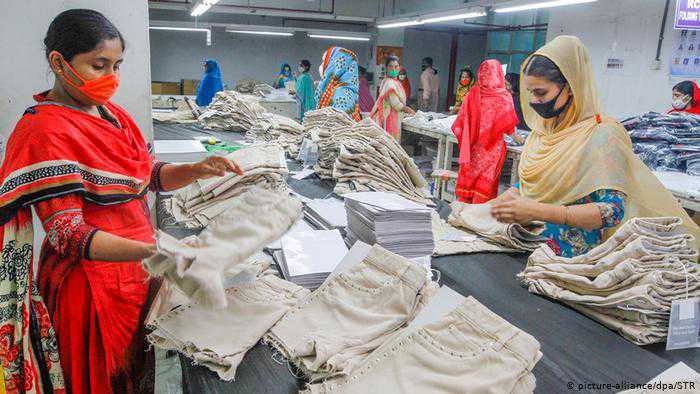Coronavirus disruptions deal severe blow to Bangladesh's garment industry

Image collected
As Bangladesh's garment factories slowly but surely reopen, manufacturers suffer from fragile global demand amid the pandemic. Big fashion makes remain cancelling orders, increasing the plight of textile employees.
Since the outbreak of the global COVID-19 health crisis, Rubana Huq has been tirelessly campaigning to improve awareness for all those laboring in the bottom end of global supply chain of textiles. In the case of Bangladesh that is an incredible number of garment factory workers fired or furloughed through the country's lockdown.
The president of the Bangladesh Garment Producers and Exporters Association (BGMEA) has repeatedly warned of the dire consequences of those workers shedding their already meager incomes as global fashion makes continue cancelling orders.
In response to the decision, europe has structured emergency funding to help them, which Huq says was "much appreciated," but could go only up to now in limiting the damage carried out to the country's textile industry.
Export dependencies
According to BGMEA numbers, orders really worth $3.18 billion (€2.8 billion) have so far been cancelled because the beginning of the COVID-19 outbreak earlier this year.
"More than 50% of the $3.18 billion worth of order cancellations are from the European clients," Huq told DW, adding this was "very unfortunate" given the prolonged history of trade ties with the EU which have produced the bloc Bangladesh's biggest outfits export market.
The Asian country is hugely reliant on the export of textiles for its national income as the industry makes up about a lot more than 80% of Bangladesh's overall exports. By comparison, the German car industry, which is reported to be essential for Germany's economy, generates less than 20% of the country's exports.
About 4 million personnel have employment with the garment industry, almost all of them female seamstresses who quite often support several family members and live from paycheck to paycheck. "Since March 2020 a number of 179 factories have been forced to shut down, and many will be in the queue," says Huq.
She acknowledges that European contractors are struggling, too, because of store closures due to national lockdown measures, but says scrapping orders which causes financial losses for just one party was "unjust."
'Elusive solutions'
German textile importers though, deny treating their Bangladeshi suppliers unfairly.
German Fashion, a business group representing this country's fashion labels, told DW found in a statement its customers didn't cancel orders "in big numbers," because they were striving to "keep up with the close relations they’ve had with their producers for several years."
"We're currently holding some talks between makers and purchasers because we are convinced the concerns can only be resolved by a willingness for compromise on both sides," a German Manner spokeswoman said.
German textiles and trend sector association, textil + mode, also said its member firms were alert to their "responsibility toward maker countries" and hadn't resorted to big-ticket cancelations lately. Firms were pursuing an insurance plan of "partnership and mutual trust," a spokeswoman of the lobby group told DW.
'Massive blow'
German coffee chain Tchibo, which offers low-budget clothing on its a lot more than 1,000 stores in the united states, said the blanket closure "virtually overnight" of all of them had "dealt an enormous blow" to the retailer's business.
Tchibo spokesman Arndt Liedtke told DW, the business would purpose though to "remain a good and long-term partner regardless of the crisis."
"For us, it has been crystal clear all along that people accept shipments in line with our contractual obligations agreed before," Liedtke says, noting that Tchibo has signed contracts for following year since it is essentially very important to producers to have clarity about demand.
BGMEA official Rubana Huq is lauding Tchibo's strategy, saying the company isn't registered in a database go by the association and identifying firms found to violate agreements or cancel repayments. Others, however, are much less forthcoming, she adds.
Kik and C&A good chastised
Germany's biggest low-price clothes retailer KiK, however, possesses been singled out by BGMEA to be currently a single of the key offenders of contractual obligations.
Garnering annual revenues around €2 billion, the spending budget retailer has cancelled goods worth $96,000 up to now, with textile shipments to the tune of $9.26 million becoming "on hold," in line with the BGMEA data supplied by factories in Bangladesh.
Source: https://www.dw.com
Previous Story
- Soreness stresses of garment personnel at workplace
- Job cut threat a trick of RMG owners...
- PPE a silver lining for ailing garment industry
- For Bangladesh's Struggling Garment Workers, Hunger Is A...
- EU to support Bangladeshi garment workers
- Bangladesh factories resume work, risking new virus cases
- Bangladesh reopens 600 apparel factories despite virus risk
- Bangladesh garment factories reopen, defying virus lockdown